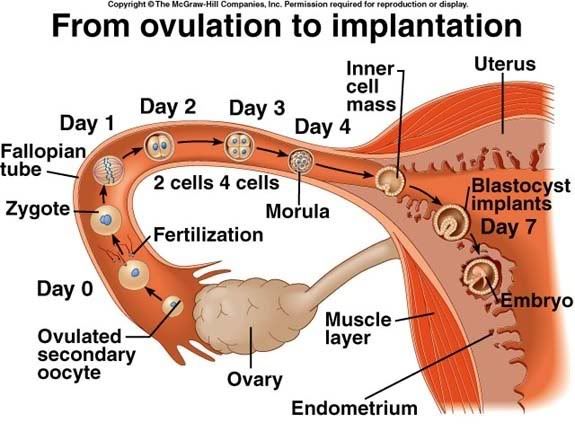 ABSTRACT
ABSTRACTBackground: Implantation of the conceptus is a key step in pregnancy, but little is known about the time of implantation or the relation between the time of implantation and the outcome of pregnancy.
Results: There were 199 conceptions, for 95 percent of which (189) we had sufficient data for analysis. Of these 189 pregnancies, 141 (75 percent) lasted at least six weeks past the last menstrual period, and the remaining 48 pregnancies (25 percent) ended in early loss. Among the pregnancies that lasted 6 weeks or more, the first appearance of chorionic gonadotropin occurred 6 to 12 days after ovulation; 118 women (84 percent) had implantation on day 8, 9, or 10. The risk of early pregnancy loss increased with later implantation (P<0.001).>
Among the 102 conceptuses that implanted by the ninth day, 13 percent ended in early loss. This proportion rose to 26 percent with implantation on day 10, to 52 percent on day 11, and to 82 percent after day 11.
Conclusions: In most successful human pregnancies, the conceptus implants 8 to 10 days after ovulation. The risk of early pregnancy loss increases with later implantation.
Photo Credit: mmq22
All Rights Reserved
TODAY'S BOOK SUGGESTION:
 Miscarriage, Medicine & Miracles: Everything You Need to Know about Miscarriage
Miscarriage, Medicine & Miracles: Everything You Need to Know about Miscarriage-- From one of the foremost doctors in the field and a journalist who has experienced multiple miscarriages herself comes an accessible, encouraging, and complete guide to both the causes and, more important, the prevention of miscarriage.
Though one in four American women will lose her pregnancy, with the right pre-pregnancy evaluation and ongoing care, for many women miscarriage can be prevented. During forty years of practice, Dr. Bruce Young has treated hundreds of women who experienced this heartbreaking loss and helped them bring babies to term. Now he has teamed up with one of his patients, Amy Zavatto, to write this compassionate guide that combines medical facts with insights from both the patient’s and doctor’s viewpoints. Including real-life case studies, Dr. Young provides in-depth answers to the questions: Why did this happen to me? and What can I do to prevent it next time?
◊ Follow us on Twitter, join the conversation on our Facebook page, circle us on Google+.
More "Pregnancy Over 40" blogs to visit:
Life Begins... - Miscarriage stories of loss, hope & help
Pregnancy Stories by Age - Daily blog of hope & inspiration!
You Can Get Pregnant in Your 40's - Sharing articles, discussing options & suggestions
Stories of Pregnancy and Birth over 44 years old - sharing news stories I find online, for inspiration!
Life Begins... - Miscarriage stories of loss, hope & help
Pregnancy Stories by Age - Daily blog of hope & inspiration!
You Can Get Pregnant in Your 40's - Sharing articles, discussing options & suggestions
Stories of Pregnancy and Birth over 44 years old - sharing news stories I find online, for inspiration!
No comments:
Post a Comment